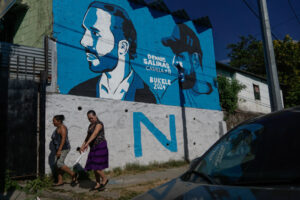This event took place on Monday, March 24, 2014. Please note that due to technical difficulties, the first ten minutes of the event were not captured on video. We apologize for the inconvenience.
There have been significant movements in the last year to prosecute human rights cases related to El Salvador’s civil war. Many of these cases—such as the Jesuit massacre of 1989 and the El Mozote massacre of 1981—have languished for years due to both a 1993 amnesty law and inertia in the judicial system.
If the government of El Salvador is to succeed in facing the challenge of organized crime and generating sustained economic growth that benefits all Salvadorans, it will have to overcome the weaknesses of its criminal justice system and demonstrate that it is capable of enforcing the law without fear or favor. One major test of the competence of the criminal justice system is the successful prosecution of long-standing human rights cases.
Internationally, there has been new interest in the Jesuit case. A Salvadoran colonel named by a Spanish court as a defendant in the Jesuit killings was arrested, convicted, and sentenced on immigration charges in Massachusetts; if he were to be extradited to Spain, the case against a group of former military officers in a Spanish court would move forward.
Other cases have begun to move forward as well. In the El Mozote case, the Inter-American Court of Human Rights has ruled that El Salvador’s amnesty law cannot bar prosecutions of grave human rights violations, and the Court has called on the government of El Salvador to prosecute the case. Domestically, the Constitutional Chamber of the Supreme Court has accepted an appeal challenging the validity of the 1993 amnesty law and may soon issue a ruling. In addition, the Chamber recently ordered the attorney general to move ahead in an investigation of the 1981 massacre in the town of San Francisco Angulo.
All this movement has emboldened victims and their families and has put the criminal justice system, especially the attorney general, to the test.
In this environment, there have also been troubling developments. In September 2013, the Archbishop of San Salvador suddenly closed Tutela Legal, the Archdiocese’s human rights legal aid office, saying it no longer had a reason to exist. The closing caused an outcry both nationally and internationally, with various actors expressing concern about cases underway and the security of Tutela’s extensive archives. In November, the offices of Pro-Búsqueda, a non-governmental organization that works with families to help locate children who were abducted during the war, were raided, and many of its files were destroyed.
In early 2014, the archdiocese of San Salvador opened a new human rights office; meanwhile, the lawyers of Tutela Legal founded a new, independent organization to carry on the cases that had been underway. Eight human rights groups, youth activists, and Christian Base Community groups have formed a “Movement for Historical Memory” to support the demands of the victims for justice.
In the midst of all of this activity, many questions remain: What is the status of human rights prosecutions today? How do these prosecutions reflect the larger issues of the strength and weaknesses of the Salvadoran criminal justice system? What role is the attorney general playing? What is the status of the amnesty law? What are human rights organizations doing now? And how will all this play out during the term in office of the recently-elected President, Salvador Sánchez Cerén?
During this event, Wilfredo Medrano of the non-governmental organization Tutela Legal María Julia Hernández and Bethany Loberg of SHARE El Salvador discussed these issues and others.
Wilfredo Medrano worked as a lawyer with Tutela Legal in the Archdiocese of San Salvador for over twenty years, accompanying the victims of the El Mozote massacre, the La Quezera massacre, and many other cases of human rights violations. He is now the director of the new Tutela Legal María Julia Hernández.
Bethany Loberg has lived and worked in El Salvador for over four years and currently accompanies the SHARE Foundation’s human rights work.

